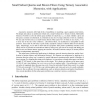Free Online Productivity Tools
i2Speak
i2Symbol
i2OCR
iTex2Img
iWeb2Print
iWeb2Shot
i2Type
iPdf2Split
iPdf2Merge
i2Bopomofo
i2Arabic
i2Style
i2Image
i2PDF
iLatex2Rtf
Sci2ools
SIGMETRICS
2010
ACM
2010
ACM
Small subset queries and bloom filters using ternary associative memories, with applications
Associative memories offer high levels of parallelism in matching a query against stored entries. We design and analyze an architecture which uses a single lookup into a Ternary Content Addressable Memory (TCAM) to solve the subset query problem for small sets, i.e., to check whether a given set (the query) contains (or alternately, is contained in) any one of a large collection of sets in a database. We use each TCAM entry as a small Ternary Bloom Filter (each ‘bit’ of which is one of {0,1,“∗” }) to store one of the sets in the collection. Like Bloom filters, our architecture is susceptible to false positives. Since each TCAM entry is quite small, asymptotic analyses of Bloom filters do not directly apply. Surprisingly, we are able to show that the asymptotic false positive probability formula can be safely used if we penalize the small Bloom filter by taking away just one bit of storage and adding just half an extra set element before applying the formula. We believe th...
| Added | 18 Jul 2010 |
| Updated | 18 Jul 2010 |
| Type | Conference |
| Year | 2010 |
| Where | SIGMETRICS |
| Authors | Ashish Goel, Pankaj Gupta |
Comments (0)

